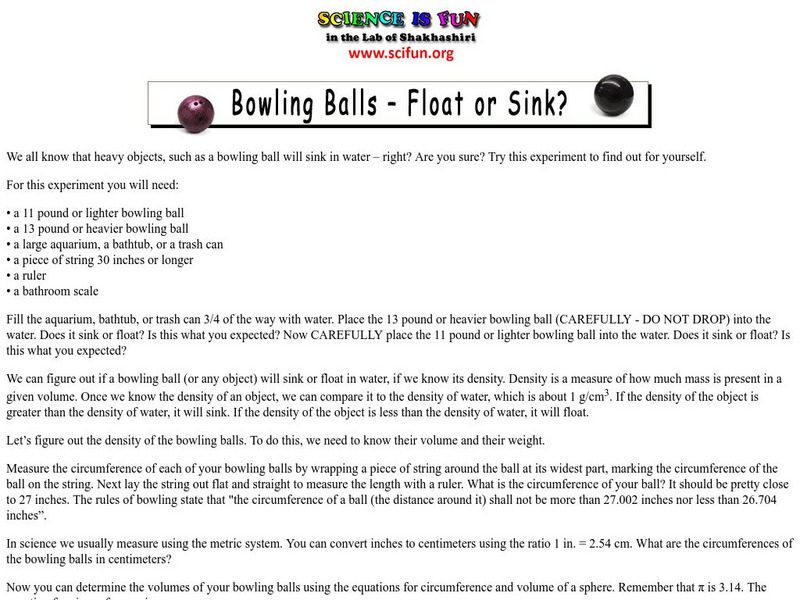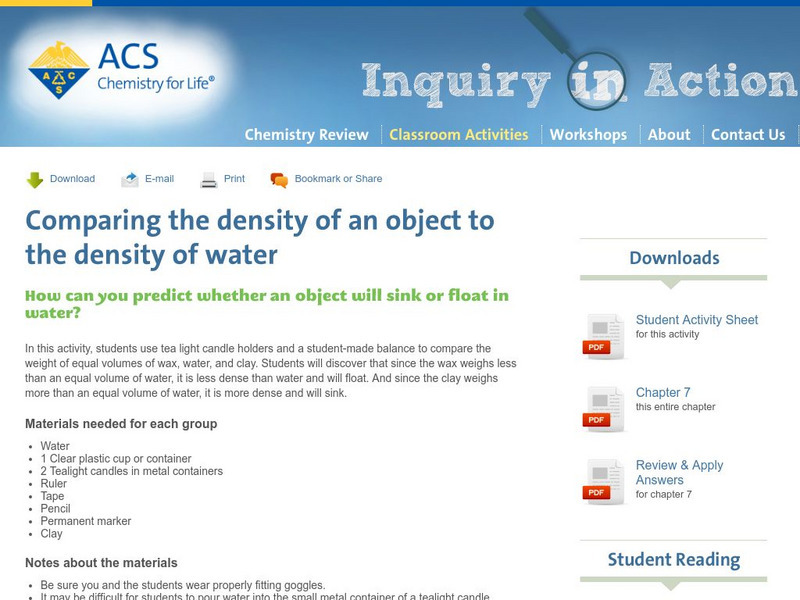American Chemical Society
Middle School Chemistry: Density: Sink and Float for Liquids
Students determine whether a liquid will sink or float in water by comparing its density to the density of water.
Other
National Engineers Week Foundation: Flinker
Students investigate with common objects to see if they can make something that neither floats nor sinks, but rather "flinks" in the middle.
PBS
Pbs Learning Media: Sesame Street: Sink or Float Educator Guide
This is an educator's guide for a unit on things that sink or float. It includes lesson plans, experiments, and activities. Learners apply the scientific method as they investigate whether objects sink or float.
Museum of Science
Museum of Science and Industry: Online Science: Design a Submarine
Become an engineer, and design a submarine that moves in the water like a real submarine. Try making it sink, float, and hover in the water.
American Chemical Society
Middle School Chemistry: Density Sink and Float for Solids
See how different solids can have different densities depending on their molecular make-up.
Science is Fun
Fun Science: Bowling Balls: Sink or Float?
For a dramatic illustration of density check out this demonstration. It's simple to do, only requiring a bowling ball and some water.
Alabama Learning Exchange
Alex: Teaching Measurement: Literature and Manipulatives
The tradebook, Who Sank the Boat? by Pamela Allen, is an excellent tool in teaching measurement. Young scholars will engage in activities involving different types of measurement. In the story, five animal friends decide to take a boat...
Bill Nye
Bill Nye: Eggs Speriment
Try this at-home science experiment to learn if salt affects the way things float.
PBS
Pbs Teachers:mysteries of the Deep: Leaky Seal
Investigate the mystery of the sinking of the Confederate submarine Hunley. Explore the mechanics of waterproofing a seal, and compare and contrast the effectiveness of a metal-to-metal seal versus one that uses a rubber gasket.
American Chemical Society
Inquiry in Action: Changing the Density of an Object: Adding Material
In this activity, students see that a can of regular cola sinks while a can of diet cola floats. As a demonstration, bubble wrap is taped to the can of regular cola to make it float. This high-volume but light-weight material increases...
American Chemical Society
Inquiry in Action: Changing the Density of an Object: Changing Shape
Throughout the activities in this investigation, students may have wondered how a boat made out of steel, which is more dense than water, can float. This activity addresses that question. Students will see that changing the shape of an...
American Chemical Society
Inquiry in Action: Defining Density
Do heavy things always sink and light things always float? In this introductory demonstration and activity, students are introduced to the concept of density as they explore a rock and a wooden block in water.
American Chemical Society
Inquiry in Action: Compare the Density of an Object to the Density of Water
In this activity, students use tea light candle holders and a student-made balance to compare the weight of equal volumes of wax, water, and clay. Students will discover that since the wax weighs less than an equal volume of water, it is...
Mocomi & Anibrain Digital Technologies
Mocomi: Buoyancy
Ever wonder why/how things float? This concept is called buoyancy. Take this interactive journey to learn and understand how and why certain materials float and others sink to the ocean floor.
Center of Science and Industry
Cosi Columbus: Buoyant Bubble [Pdf]
Learn about density in this hands-on science experiment. Includes full list of materials, procedures, and scientific explanation of what makes an object float or sink. [PDF]
PBS
Pbs Teachers: Scientific American: Beneath the Sea: Blowing Ballast
Explore the use of ballast to manipulate buoyancy in submarines by building a model of a submersible using two-liter bottles and balloons. Describe the balance of forces that is responsible for the surfacing and diving of submersibles.
Other popular searches
- Sink Float
- Sink or Float
- Sink and Float
- Sink Float Buoyancy
- Sink Float Lessons
- Float Sink Float
- Fruit Sink Float
- Sink Float Song
- Sink Float Explanations
- Sink and Float Bubbles
- Sink Float Submerge
- Sink or Float Experiment











